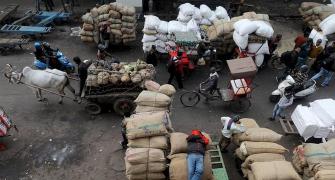The three-month long budget session of the Lok Sabha was on Monday adjourned sine die four days ahead of schedule amid protests by key government ally Communist Party of India over its abrupt end and without taking up the Women's Reservation Bill.
The House was adjourned sine die by Speaker Somnath Chatterjee soon after the crisis over his action of referring the cases of 32 MPs, mostly from the Bharatiya Janata Party-led National Democratic Alliance, to the Privileges Committee for "disorderly conduct" came to an end.
Though the crisis was resolved, the speaker used the occasion to remind the MPs "that instances of interruptions and forced adjournments and defying the authority of the chair do not help our common goal of public welfare and executive accountability."
Soon after the House was adjourned sine die, CPI Deputy Leader Gurudas Dasgupta protested over the way the Congress and the BJP "came together" for adjourning the House ahead of schedule.
"This is a mockery of the Parliamentary system of democracy. The prime minister had assured us that the Women's Reservation Bill would be tabled in this session. This makes his assurance a hoax," he told reporters.
During the session, the opposition sought to corner the government on the issue of rising prices of food grains and lack of availability of edible commodities in the Public Distribution System.
Amid intense debates on the situation arising out of rising prices, the government sought to allay the fears of an impending food crisis.
The first part of the budget session commenced on February 25 and the House was adjourned on March 19.
The second part of the budget session commenced on April 15 after the recess.
The session had a total of 28 sittings. Of these, 16 sittings were held in the second part of the session.
The House discussed the Motion of Thanks to the President's address for over three days. Before the conclusion of the debate, 51 amendments were moved and negatived.
During the session, 17 government bills were introduced and one bill was withdrawn.
In all the House passed 20 bills, which included five Ordinance replacing bills.
Some 307 matters of urgent public importance were raised by the members after the Question Hour.
In this session, the departmentally related standing committee presented 62 reports.
Twenty-three private members' bills were introduced during the session.
The House had a meaningful and structured debate lasting for six hours and 52 minutes on the situation arising out of price rise.







